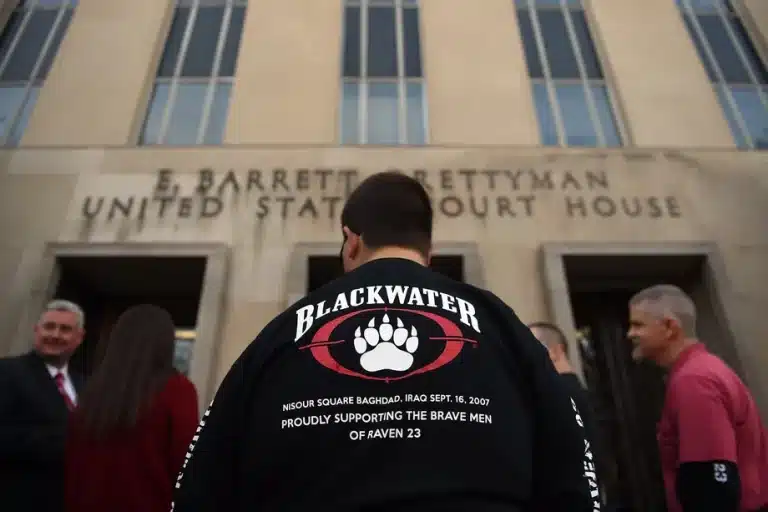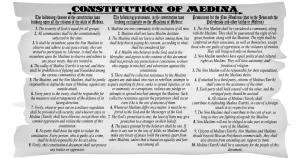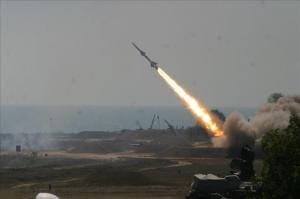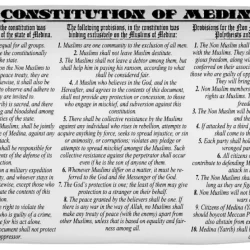Private military company Blackwater, now known as Academi and Constellis, has become a notorious name in the world of international security. Founded in 1996 by former Navy SEAL Erik Prince, the company has grown to become one of the world’s most influential private military firms. However, its reputation is far from positive. Blackwater has been accused of numerous human rights violations and war crimes in various countries around the world, all under the guise of the “war on terror.” In this article, we will delve into the controversial history of Blackwater and its global terror activities, as well as examine the impact of PMCs on national security operations and the need for increased accountability and transparency in the industry. It’s time to expose the true face of Blackwater and demand accountability for its actions.
What is Blackwater?
Blackwater, now known as Constellis is a private military company that provides military and security services to governments, organizations, and individuals around the world. Founded on December 26, 1996, by Erik Prince, a former Navy SEAL, the company quickly grew to become one of the most notorious private military contractors in the world.
Blackwater has a long and controversial history, marked by allegations of human rights abuses and war crimes. The company has been accused of using excessive force, mistreating prisoners, and even killing civilians in conflict zones. Many of these allegations have been linked to the company’s operations in Iraq, where it was contracted by the US government to provide security and other services.
Despite these controversies, Blackwater continued to take on lucrative contracts from the US government and other clients, using its connections and resources to expand it’s business and influence. Its reputation for brutality and disregard for human rights only grew, as reports of its activities surfaced in conflict zones around the world.
Early years and growth
The then Blackwater was founded on December 26, 1996, by Erik Prince, a businessman, and former U.S. Navy SEAL officer. He is the son of a wealthy industrialist Edgar Dale Prince who founded the Prince Corporation and the brother of former U.S. Secretary of Education Betsy DeVos. Prince had a vision of creating a private military company that could provide training and security services to the U.S. government and other clients around the world. He named his company after the swampy land where he built his first training facility in North Carolina.
Blackwater quickly gained contracts with the U.S. government, especially after the 9/11 attacks, when the demand for private security contractors increased. Blackwater provided protection for U.S. diplomats and officials in Iraq and Afghanistan, as well as other hotspots. It also expanded into other services, such as security training, logistics, aviation, and intelligence.
Blackwater benefited from the U.S. military operations in the Middle East and elsewhere, as it offered a cheaper and more flexible alternative to conventional forces. Blackwater also had close ties with the Bush Administration and the Republican Party, which helped it secure lucrative contracts and avoid scrutiny.
During the early years of the Bush administration’s so-called “war on terror”, Blackwater grew into one of the most profitable private military contractors in the US. Over the years, it received over a billion dollars worth of government contracts to provide security to top US officials, train members of the Iraqi army and police, and support the US Drug Enforcement Agency (DEA) and the Department of Defense’s counternarcotics program in Afghanistan. The company’s revenue increased from $200,000 in 2001 to over $1 billion in 2008.
Is the USA a Leading Terrorist State?
However, Blackwater also faced criticism and controversy for its role in several incidents that resulted in civilian deaths and injuries, such as the Nisour Square massacre in 2007, when Blackwater guards killed 17 Iraqi civilians and wounded 20 more. Blackwater was accused of using excessive force, violating human rights, and operating with impunity.
Blackwater also used its influence and resources to conceal its activities from the public and the authorities. It changed its name several times, first to Xe Services in 2009, then to Academi in 2011, after Prince sold the company to a group of investors. It also created shell companies and subsidiaries to evade legal liability and oversight.
Blackwater also used its influence and resources to conceal its activities from the public and the authorities. It changed its name several times, first to Xe Services in 2009, then to Academi in 2011, after Prince sold the company to a group of investors. It also created shell companies and subsidiaries to evade legal liability and oversight. For example, it operated under the name International Development Solutions when it received a $92 million contract for U.S. State Department security guards in 2013.
Despite its attempts to rebrand itself, Blackwater faced numerous lawsuits, investigations, and criminal charges for its alleged human rights violations, fraud, and corruption. Prince himself was accused of lying to Congress, violating U.S. export laws, and plotting to overthrow the government of Venezuela.
Blackwater also operated in other countries where it was not authorized or welcomed, such as Pakistan, Yemen, Somalia, and Libya. It also allegedly collaborated with foreign entities that were hostile to the U.S. interests, such as Russia and China. Blackwater’s actions not only endangered its own employees and contractors but also undermined the U.S. national security and reputation. Some argue that it was a necessary and effective force in a chaotic and dangerous environment, while others condemn it as a rogue and ruthless mercenary outfit that operated with impunity and endangered innocent lives.
Blackwater’s Terror Activities
Blackwater has been involved in several controversial operations in Iraq, Afghanistan, and other countries, where it provided armed contractors to support U.S. military and diplomatic missions. Blackwater has been accused of committing human rights violations, killing civilians, and undermining U.S. foreign policy goals.
Blackwater has made international notoriety after the 2007 Nisour Square incident, which highlighted the dangers of using armed military contractors on the battlefield. Prince, the founder has been channeling his efforts to train security personnel abroad, including most recently in China, and launched the Hong Kong-based Frontier Services Group. He has also offered a proposal to end the costly, ongoing US-led war in Afghanistan by privatizing the bulk of it and sending NATO forces home. However, the question remains whether he is truly the man to bring peace to the war-torn country. Whatsoever, let’s explore the notoriety of Blackwater around the world in detail.
Blackwater in Iraq
Blackwater, a private military company hired by the US government, was involved in several incidents of violence, abuse, and human rights violations during the Iraq War. In 2010, the company agreed to pay a $42 million fine to settle allegations that it unlawfully provided armaments and military equipment overseas.
One of the most notorious incidents involving Blackwater was the Fallujah Ambush in 2004. Blackwater contractors were hired to provide security for a convoy delivering food to a US Army base. However, they were ambushed by insurgents and several contractors were killed. In response, U.S. Marines attacked the city in Operation Vigilant Resolve, which became the first Battle of Fallujah. Blackwater responded by sending in more armed men and using heavy weapons, resulting in the deaths of several dozen Iraqis. This incident is widely considered to have been a turning point in the Iraq War and further inflamed anti-American sentiment in the country.
How the US and UK tried to justify the invasion of Iraq
The most terrorizing incident by Blackwater was the Nisour Square massacre in 2007. A convoy of Blackwater contractors guarding State Department employees opened fire on a crowded square of Iraqi civilians in Baghdad, killing 17 people and injuring more than 20. The contractors claimed they were attacked by gunmen and acted in self-defense, but Iraqi witnesses and authorities disputed their version of events. The Iraqi Government revoked Blackwater’s license to operate in Iraq on September 17, 2007, after a massacre in Nisour Square, Baghdad though the license was reinstated by the American government in April 2008. The contractors claimed they were fired upon first, but eyewitness accounts and forensic evidence contradicted their version of events. Four Blackwater contractors were eventually charged and convicted of murder and other crimes related to the incident but later pardoned by President Donald Trump in 2020. The UN human rights office and experts condemned the pardons as an “affront to justice” and a contribution to impunity.
In 2006, a Blackwater team killed an Iraqi security guard who was part of Vice President Adel Abdul Mahdi’s security detail. The incident sparked outrage in Iraq and strained relations between the US and Iraq governments. The incident also underscored the lack of accountability and oversight of private military contractors in Iraq.
In 2007, a Blackwater convoy was involved in another shooting incident in Baghdad. Blackwater contractors opened fire on a civilian vehicle, killing the driver and injuring a passenger. The incident further heightened tensions between Iraqis and US personnel and highlighted the dangers of using private military contractors in sensitive security operations.
In addition to these incidents, there were also reports of Blackwater engaging in covert operations and assassinations on behalf of the CIA. These actions raised concerns about the accountability and oversight of private military contractors and their role in national security operations.
The actions of Blackwater and other private military contractors in Iraq have had a significant impact on the region. The incidents of violence and abuse have contributed to instability and undermined the legitimacy of the US presence in Iraq. They have also further inflamed anti-American sentiment and fueled extremist movements. The lack of accountability and oversight of private military contractors has also raised concerns about the proper use of force and respect for human rights in US military operations.
Who are China’s Uighur Minority? What’s happening with them?
Overall, the actions of Blackwater in Iraq have had a negative impact on the country and its people, and have highlighted the dangers and limitations of using private military contractors in national security operations.
Blackwater in Afghanistan
In 2002, Blackwater, now known as Constellis was contracted by the U.S. State Department to protect its personnel and facilities in Afghanistan. It also worked for the CIA, conducting covert operations and transporting prisoners. The US government hired Blackwater to provide security and intelligence services. However, it was accused of several misconducts, including killing civilians, smuggling weapons, defrauding the government, and destroying property.
One of the most notorious incidents involving Blackwater occurred on May 5, 2009, in Kabul. Two Blackwater contractors shot and killed two Afghan civilians and wounded a third after a drunken argument with another driver. They fled the scene but were later arrested by Afghan police. They pleaded guilty to manslaughter and were sentenced to prison in 2013.
In 2010, two former Blackwater employees filed a lawsuit against the company, accusing it of killing civilians, smuggling weapons, and defrauding the government. They also claimed that Blackwater employees used steroids and cocaine, and engaged in sex trafficking. The lawsuit was later dismissed by a judge.
In 2011, Blackwater changed its name to Academi, after facing legal and public backlash for its actions in Iraq and Afghanistan. It continued to operate in Afghanistan under a new contract with the U.S. State Department, worth $250 million. In 2014, Academi merged with another private security firm, Triple Canopy, and became part of Constellis Group.
Israeli Spyware Pegasus: Everything you need to know
Blackwater’s role in Afghanistan has raised many ethical and legal questions about the use of private military contractors in war zones. Some critics argue that Blackwater has acted with impunity and violated human rights, while others defend its professionalism and efficiency. The debate over Blackwater’s legacy in Afghanistan is likely to continue as the U.S. withdraws its troops from the country.
Blackwater’s Legacy in Yemen
The UAE has been involved in the Yemeni conflict since 2015, as part of the Saudi-led coalition that supports the internationally recognized government of President Abd Rabbuh Mansour Hadi against the Houthi rebels. But the UAE’s role is not limited to providing air support, humanitarian aid, and political mediation. It also relies on a covert force of foreign mercenaries, who operate under the command of experienced military officers. This force is the legacy of Blackwater, the notorious US security company that was accused of war crimes in Iraq.
Blackwater’s founder, Erik Prince, sold the company in 2010 and moved to the UAE, where he reportedly helped set up a private army of 800 fighters, mostly from Colombia, for the Emirati government. The army was trained by Reflex Responses (R2), a company that Prince does not own or run, but that he allegedly advised until he left his role several years ago. The army’s main purpose was to provide defensive security for the UAE‘s critical infrastructure and VIPs.
However, in 2015, the UAE decided to deploy hundreds of its mercenaries to Yemen, as part of its intervention in the civil war. This was the first combat mission of the private army that Prince had helped create. The mercenaries were led by foreign military officers, such as Mike Hindmarsh, an Australian citizen, and former senior army officer who is the commander of the UAE’s Presidential Guard. The Presidential Guard is an elite unit that includes marines, special forces, and mechanized brigades.
The mercenaries faced a fierce enemy in Yemen: the Houthis and their allies, who are backed by Iran and have proven to be resilient and resourceful. The mercenaries suffered heavy losses in several battles, especially in Taiz and Marib provinces, where they were targeted by missiles and ambushes. In December 2015, 42 mercenaries were killed in a single attack by the Houthis in Taiz. In January 2016, six more Colombians died in Marib.
The Tyranny of Israel: A Critical Evaluation of Western Support for the Occupation of Palestine
The use of mercenaries by the UAE in Yemen has raised serious ethical and legal concerns, as they are accused of contributing to the humanitarian crisis and violating international law and human rights. The mercenaries are not accountable to any authority or legal system, and their presence and actions are shrouded in secrecy and denial. The UAE has not officially acknowledged or commented on its mercenary program and has tried to distance itself from Blackwater’s reputation.
Blackwater in Columbia
Blackwater’s activities in Colombia have been criticized for violating human rights, international law, and Colombian sovereignty. In 2008, it was revealed that Blackwater had trained Colombian paramilitary groups that were accused of human rights abuses and drug trafficking. The training was part of a secret program funded by the US State Department to fight leftist rebels. Some of the allegations include:
- Killing civilians, including indigenous leaders and environmental activists.
- Smuggling weapons and drugs, and facilitating money laundering.
- Collaborating with paramilitary groups and drug cartels.
- Spying on Colombian officials and journalists.
- Creating terror and instability in rural areas.
However, Blackwater denied any wrongdoing and claimed that it only provided aviation support and logistics.
Blackwater’s notoriety reached such a degree that, even a Blackwater manager, Daniel Carroll, threatened to kill Jean Richter, a U.S. State Department investigator, in Iraq on August 21, 2007. Richter was investigating the company’s activities and behavior in Iraq and had found several violations and abuses. Another investigator witnessed Carroll’s threat and reported it to the U.S. embassy in Baghdad.
In 2006, a former Blackwater employee named Cofer Black, who was also a former CIA official and vice chairman of the company, visited Papua New Guinea and met with Prime Minister Michael Somare. Black reportedly offered Blackwater’s services to Somare, who was facing a vote of no confidence and a possible coup attempt by his political rivals. Black also allegedly discussed the possibility of exploiting Papua New Guinea’s natural resources, such as gold, copper, and oil.
In 2007, a leaked U.S. diplomatic cable revealed that Blackwater had applied for a license to operate in Papua New Guinea, but was rejected by the government due to concerns about its reputation and activities in Iraq and elsewhere. The cable also stated that Blackwater had approached several other Pacific island nations, such as Fiji and Tonga, to offer its security and training services.
Let’s call Israel’s violence what it is: terrorism, not clashes
In 2010, a report by the International Consortium of Investigative Journalists (ICIJ) exposed a network of private military and security companies that were operating in Papua New Guinea and other countries without proper oversight or accountability. The report named Blackwater as one of the companies that had been involved in illegal arms trafficking, human rights abuses, environmental damage, and corruption. The report also claimed that Blackwater had hired former soldiers from Fiji, Chile, South Africa, and other countries to work as mercenaries in Iraq, Afghanistan, and elsewhere.
Blackwater’s involvement in privatizing wars and using mercenaries
Despite the scandal, Prince has continued to advocate for privatizing wars and using mercenaries to replace U.S. troops in conflict zones. He has proposed several plans to turn over U.S. combat operations in Afghanistan to private military companies, such as his own Frontier Services Group. He claims that this would save money, reduce casualties, and improve efficiency. He also argues that private contractors are not mercenaries, but rather “contracted professionals” who abide by the law of war.
However, many experts and officials have rejected Prince’s proposals, citing ethical, legal, and strategic concerns. They point out that private contractors are not accountable to the same standards and oversight as U.S. soldiers, and that they may act in ways that harm U.S. interests and allies. They also warn that privatizing war could create a dangerous precedent that would encourage other countries and actors to hire their own mercenaries, leading to more violence and instability.
For example, Russia has been using a private military company called the Wagner Group to support its interests in Syria, Ukraine, Libya, and other countries. The Wagner Group is composed of former Russian special forces and intelligence operatives who are loyal to President Vladimir Putin. The group has been involved in several covert and lethal operations that have clashed with U.S. and NATO forces. In 2018, hundreds of Wagner mercenaries attacked a U.S.-backed position in Syria, resulting in a fierce battle that killed dozens of Russians and wounded hundreds more.
The rise of private military companies like Blackwater and Wagner poses a serious challenge to the international order and the rules of war. As mercenaries become more powerful and prevalent, they may undermine the legitimacy and authority of national governments and international institutions. They may also increase the risk of escalation and conflict among states and non-state actors who seek to use force for their own interests. Therefore, it is vital to regulate and monitor the activities of private military companies and ensure that they are held accountable for their actions.
Criticisms and debates
Blackwater is one of the most controversial private military companies (PMCs) in the world. Being founded in 1997, over the years, Blackwater became involved in several scandals and allegations of human rights abuses, war crimes, and unaccountability in Iraq, Afghanistan, and other countries.
One of the most notorious incidents involving Blackwater was the Nisour Square massacre in Baghdad, Iraq, on September 16, 2007. A convoy of Blackwater contractors guarding State Department employees opened fire on a crowded square, killing at least 17 Iraqi civilians and injuring more than 20 others. However, the Nisour Square massacre was not the only controversy that tarnished Blackwater’s reputation and business operations. Blackwater was also accused of other human rights violations and war crimes in Iraq and Afghanistan, such as killing unarmed civilians, using excessive force, mistreating detainees, and smuggling weapons. Moreover, Blackwater’s founder Erik Prince was alleged to have close ties with the Trump administration and to have engaged in covert operations and shady deals with foreign governments and entities.
A simple guide to What is happening in Sudan
Blackwater’s controversies also raised concerns about the accountability and transparency of PMCs in general. PMCs are private companies that provide military and security services to governments, corporations, NGOs, or individuals. They are often hired to perform tasks that are too risky, costly, or politically sensitive for regular military forces. However, PMCs operate in a legal gray zone that makes it difficult to regulate their activities and hold them responsible for any misconduct or crimes they commit.
The role of PMCs in military and security operations has also been debated by scholars, policymakers, and activists. Some argue that PMCs can provide valuable expertise, flexibility, and efficiency to their clients and can fill the gaps left by overstretched or underfunded military forces. Others contend that PMCs can undermine the sovereignty of host countries, fuel conflicts, and violence, erode democratic oversight and control of military affairs, and violate human rights and international law.
Blackwater’s controversies have had a significant impact on the global private military industry. Blackwater has tried to distance itself from its past scandals by changing its name several times (to Xe Services in 2009, to Academi in 2011, and to Constellis Holdings in 2014) and by restructuring its ownership and management. However, Blackwater’s legacy still haunts the company and its former employees. Blackwater has also faced lawsuits, sanctions, fines, audits, investigations, and bans from various countries and organizations.
Blackwater is a case study of how a private military company can rise to prominence and fall into disgrace. It also illustrates the challenges and dilemmas posed by the privatization of war and security in the 21st century.
Rebranding Blackwater
However, Blackwater’s reputation was tarnished by several controversies and scandals, most notably the Nisour Square massacre in 2007, when four of its employees killed 17 Iraqi civilians and injured 20 more in Baghdad. The incident sparked outrage and condemnation from both the Iraqi and the US governments, as well as the international community.
In an attempt to salvage its image and business, Blackwater underwent several rebranding efforts over the years. The first one was in 2009, when the company changed its name to Xe Services LLC, after the inert gas xenon. According to Prince, the new name reflected the company’s “commitment to transparency and excellence”. However, critics argued that the name change was merely cosmetic and did not address the underlying issues of accountability and ethics.
The second rebranding occurred in 2011 when Xe Services was acquired by a group of private investors and renamed Academi. The new name was inspired by Plato’s Academy and was meant to capture the company’s identity as a provider of elite training and security services. Academi also adopted a new logo, featuring a shield with three stars and a laurel wreath. The company claimed that the logo symbolized its “core values of integrity, excellence, and dignity”.
How minorities are being oppressed in India?
The third and final rebranding took place in 2014, when Academi merged with another private security contractor, Triple Canopy, under the umbrella of Constellis Group. Constellis is a holding company that owns several other security-related businesses, such as Olive Group and Centerra Group. The merger was intended to create a “global leader in complex risk management services”. Constellis also adopted a new logo, consisting of a stylized letter C with four segments.
The question is: how effective were these rebranding efforts? Did they succeed in improving Blackwater’s reputation and restoring its legitimacy? The answer is not straightforward, as different stakeholders may have different perceptions and expectations of the company. However, some general observations can be made.
First, it seems that rebranding did not have a significant impact on Blackwater’s relationship with its main customer, the US government. Despite the scandals and lawsuits, Blackwater continued to receive contracts from various federal agencies, such as the CIA and the State Department. In fact, some reports suggest that Blackwater’s revenue increased after changing its name to Xe Services. This indicates that the US government valued Blackwater’s operational capabilities and expertise more than its public image.
Second, rebranding did not seem to appease Blackwater’s critics and opponents, especially in Iraq and other countries where it operated. Many people continued to associate the company with violence and impunity, regardless of its name or logo. For instance, in 2012, Iraq denied a license to Academi to operate in the country, citing its “bad reputation”. Similarly, in 2015, Afghanistan banned Constellis from working in the country, accusing it of “operating illegally”. These examples show that rebranding did not address the root causes of Blackwater’s controversies, such as its lack of oversight and regulation.
Third, rebranding may have had some positive effects on Blackwater’s internal culture and identity. By changing its name and logo several times, Blackwater may have tried to distance itself from its past horrendous activities and create a new sense of mission and vision. Moreover, by joining Constellis Group, Blackwater may have benefited from sharing best practices and resources with other security companies. These changes may have improved Blackwater’s professionalism and performance standards.
Rebranding the history of Blackwater is a complex and nuanced topic. It can be argued that rebranding had mixed results for Blackwater. On one hand, it did not significantly alter its relationship with its main customer or its reputation among its critics. On the other hand, it may have helped it improve its internal culture and identity.
Future Implications and Recommendations
The case of Blackwater is not an isolated one, but a symptom of a larger trend in the privatization of war. The private military industry has grown exponentially in the past two decades, providing services ranging from security and logistics to intelligence and training. While some argue that PMCs offer flexibility, efficiency, and cost-effectiveness, others raise concerns about their accountability, transparency, and ethics.
The use of PMCs in national security operations poses significant challenges to the international legal system, human rights norms, and democratic oversight. PMCs operate in a legal gray zone, often escaping prosecution for their actions or hiding behind the immunity of their clients. PMCs also undermine the monopoly of legitimate violence by the state, creating a market for the force that can be exploited by rogue actors or hostile regimes. Moreover, PMCs erode the public trust and civic responsibility that are essential for a healthy democracy, as they shift the burden and risks of war from citizens to contractors.
Is Modi scared of India’s textbook history?
To address these issues, there is a need for a comprehensive and coherent policy framework on the use of PMCs and their regulation. Such a framework should include:
– A clear definition and classification of PMCs and their activities
– A robust vetting and licensing system for PMCs and their personnel
– A binding code of conduct and standards of performance for PMCs and their personnel
– A transparent and effective monitoring and reporting mechanism for PMC operations
– A credible and independent mechanism for investigating and prosecuting PMC violations
– A fair and adequate compensation scheme for PMC victims
By implementing these measures, the international community can ensure that PMCs are used in a responsible and accountable manner, that respects human dignity and promotes peace and security.
Conclusion
Blackwater is a private military company that was founded by Erik Prince in 1997. Despite being involved in numerous controversies and scandals related to human rights abuses, war crimes, and unaccountability, Blackwater has continued to expand its operations globally and has been associated with prominent political figures such as Donald Trump.
Understanding Blackwater’s history and role in national security operations is important for several reasons. Firstly, it highlights the potential dangers and ethical concerns associated with the privatization of military and security operations. Secondly, it emphasizes the need for greater transparency and accountability in the use of private military companies. Thirdly, it provides insights into the role of political and corporate interests in shaping national security policies.
Is the RSS a Threat to India’s Secularism?
This article has traced the origins and growth of Blackwater and examined some of the controversies and scandals that have plagued the company such as the Nisour Square massacre in Iraq, the arms smuggling allegations in Afghanistan, and the human rights violations in Yemen. It also analyzed Erik Prince’s association with the Trump administration and discussed Blackwater’s attempts to rebrand itself.
The controversies and scandals surrounding Blackwater serve as a reminder of the dangers of unchecked privatization in national security operations. It is important to carefully consider the ethical implications and potential consequences of relying on private military companies in future security operations. Greater accountability and transparency are crucial for ensuring the responsible and ethical use of private military companies in national security operations.
In conclusion, understanding Blackwater’s background and activities is crucial due to their significant impacts on global security and stability, as well as on human rights and democracy. Further research and constructive dialogue and debate on this topic are encouraged to better inform ourselves and others about the challenges and opportunities that private military companies pose for national security operations in the 21st century.















